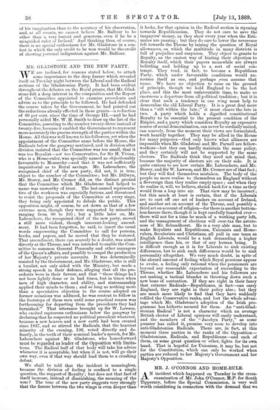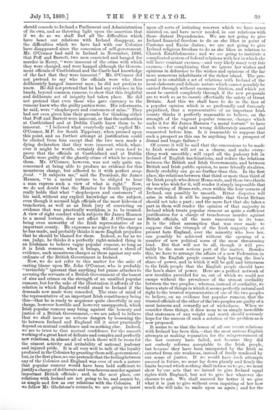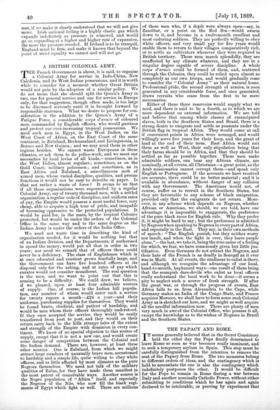MR. J., O'CONNOR AND HOME-RULE.
_LA I! incident which happened on Tuesday in the cross- examination of Mr. John O'Connor, M.P. for South Tipperary, before the Special Commission, is very well worth considering in connection with the demand that we should concede to Ireland a Parliament and Administration of its own, and as throwing light upon the assertion that if we do so we shall find all the difficulties which have beset our relations with Ireland disappear, as the difficulties which we have had with our Colonies have disappeared since the concession of self-government. Mr. O'Connor had said in Ireland in November, 1886, that Poff and Barrett, two men convicted and hanged for murder in Kerry, "were innocent of the crime with which they were charged, and were hanged although the Govern- ment officials of Castleisland and the Castle had knowledge of the fact that they were innocent." Mr. O'Connor did not pretend to say who the officials were who thus deliberately hanged innocent men ; he did not profess to know. He did not pretend that he had any evidence in his hands, beyond common rumour, to show that this frightful and deliberate act of iniquity had taken place. He did not pretend that even those who gave currency to the rumour knew who the guilty parties were. His informants, he said, were "shopkeepers and customers of mine." They had not even given him their grounds for thinking either that Poff and Barrett were innocent, or that the authorities at Castleisland and at Dublin Castle knew them to be innocent. "I believed what everybody said," replied Mr. O'Connor, M.P. for South Tipperary, when pressed upon this point, and no further attempt at justification could be elicited from him except that the two men made a dying declaration that they were innocent, which, what- ever it might be worth, certainly did not even tend to prove that the officials at Castleisland and at Dublin Castle were guilty of the ghastly crime of which he accuses them. Mr. O'Connor, however, was not only quite un- concerned at being able to produce no evidence for this monstrous charge, but adhered to it with perfect sang- froid. "It subjects me," said the President, Sir James Hannen, "to a moral torture to be obliged to hear a man express such a view of what is right." Now, we do not doubt that the Member for South Tipperary really holds that what "shopkeepers and customers" of his said, without any explicit knowledge on the subject, even though it accused high officials of the most hideous of treacheries, as well as an Irish jury of convicting on evidence that was practically worthless, is to be trusted. A view of right conduct which subjects Sir James Hannen to a moral torture, does not affect Mr. J. O'Connor as being even unworthy of the Irish representative of an important county. He expresses no regret for the charges he has made, and probably thinks it mere English prejudice that he should be blamed for them. Indeed, so far as we can judge, he thinks it a perfectly right-minded thing in an Irishman to believe vague popular rumour, so long as it is Irish rumour, when it brings, without a shred of evidence, such monstrous charges as these against any sub- ordinate of the British Government in Ireland.
Now, we do not refer to this matter for the sake of casting blame upon Mr. John O'Connor, who is probably 'invincibly" ignorant that anything but praise attaches to accusing the servants of a British Government of the basest of sins and crimes on the strength of an unsifted popular rumour, but for the sake of the illustration it affords of the relation in which England would stand to Ireland if the demands now made were conceded. The state of mind of the representative of an important Irish constituency being this—that he is ready to acquiesce quite cheerfully in any charge, however horrible and however unsupported, which Irish popular rumour may bring against the honesty and justice of a British Government,—we are asked to believe that we shall incur no serious dangers by loosening the tie between Ireland and England till it must practically depend on mutual confidence and on nothing else. Indeed, we are to trust to that mutual confidence for the smooth working of a great knot of delicate and complex and perfectly new relations, in almost all of which there will be room for the utmost activity and irritability of national jealousy and injured pride. It is all very well to talk of the loyalty produced in the Colonies by granting them self- government ; but, in the first place, no one pretends that the feelin g bet ween any of the Colonies and England was ever of such a nature that popular rumour would have been held sufficient to justify a charge of deliberate and treacherous murder against important British officials ; and, in the next place, our relations with Ireland are not going to be, and cannot be, as simple and few as our relations with the Colonies. If we follow Mr. Gladstone's counsels, we are going to insist upon all sorts of irritating reserves which we have never insisted on, and have never needed, in our relation& with those distant Dependencies. We are not going to give Ireland financial freedom to do as she likes in point of Customs and Excise duties ; we are not going to give Ireland religious freedom to do as she likes in relation to Church Establishments ; and we are going to institute a complicated system of federal relations with her in which she will have constant excuses,—and very likely many very fair excuses,—for complaining that we ignore her wishes and opinions in deference to the wishes and opinions of the far more numerous inhabitants of the richer island. The pro- posal is to establish a set of relations with Ireland of the most elaborate and delicate nature which cannot possibly be carried through without enormous friction, and which yet must be carried completely through if the new proposals are to work so as to ensure effectually the safety of Great Britain. And this we shall have to do in the face of a popular opinion which is so profoundly and furiously prejudiced, that a representative of an important Irish county thinks it perfectly reasonable to believe, on the strength of the vaguest popular rumour, charges which make it for Sir James Hannen "a moral torture" to have such views of right and wrong deliberately asserted and reasserted before him. Is it reasonable to suppose that such a prospect as this can be anything but a prospect of dismal and tragic failure ?
Of course it will be said that the concessions to be made to Irish wishes will act as a charm, and make every- thing work smoothly ; will expel all the jealousy felt in Ireland of English machinations, and reduce the relations between the British and Irish Governments, and between British and Irish public opinion, to mere friendly rivalries. Surely credulity can go no further than this. In the first place, the relations between that third or more than third of the Irish people who detest Home-rule, and those two-thirds or less who wish for it, will render it simply impossible that the working of Home-rule, even within the four corners of Ireland, can possibly be smooth. Bitter disputes will arise in which it will be impossible that Great Britain should not take a part ; and the mere fact that she takes a part in them will render the opinion of that majority in Ireland which treats popular rumour as quite a sufficient justification for a charge of treacherous murder against British officials, all the more rancorous in its tone. It is the idlest assumption that was ever made to suppose that the triumph of the Irish majority who at present hate England, over the minority who love her, can possibly be achieved without the opening of a number of new political sores of the most threatening kind. But that will not be all, though it will pro- bably be the most serious part of the matter. Besides this, we have to arrange the affairs of a new Federation in which the English people cannot help having the lion's share of power, and in which it will be gall and bitterness to the Irish people that the English people should have the lion's share of power. Here are a perfect network of new troubles provided for us, out of which we could not escape without the prevalence of the utmost cordiality between the two peoples ; whereas, instead of cordiality, we have a state of things in which it seems perfectly natural and right to the trusted representative of one of the two peoples to believe, on no evidence but popular rumour, that the trusted officials of the other of the two peoples are guilty of a most heinous and cowardly act of wickedness. When we consider these things, it does seem to us simply incredible that statesmen of any weight and worth should seriously hope for the success of such a solution of the problem as is now proposed. It seems to us that the lesson of all our recent relations with Ireland has been this,—that the most serious English attempts at making reparation for the misgovernment of the last century have failed, not because they did not embody reforms acceptable to the Irish people, but because they have been interpreted by the Irish as extorted from our weakness, instead of freely rendered by our sense of justice. If we would have such attempts succeed in future, we must lay down plainly and firmly the limits beyond which nothing shall induce us to go ; we must show by our acts that we intend to give Ireland equal rights with England, but not to give her whatever she chooses to ask. We shall succeed far better if we give what it is just to give without even inquiring of her how much she will take to smile upon us again ; and for the rest, if we make it clearly understood that we will not give more. Irish national feeling is a highly elastic gas which expands indefinitely as pressure is removed, and would go on expanding at a higher and higher rate of expansion, the more the pressure receded. If Ireland is to be tranquil, England must be firm, and make it known that beyond the point of strict equality we cannot and will not go.




































 Previous page
Previous page